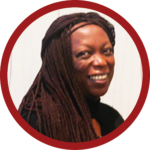
Hope was struggling to accept that her mother was gone, and she was refusing to eat and interact with people which made her become very isolated. This scared her big brother, who decided to call 116 and speak to one of the counsellors.
The counsellor wanted to speak to Hope, but she much preferred to speak in person, and so her brother brought her to the child helpline the following day. It was difficult for her, but she managed to talk about the pain that she was feeling – her father had already died when she was very small, so now she had lost both parents. Hope was feeling alone and isolated, nothing made sense to her anymore, and she said she wanted to die so that she could be with her mom again.
After a series of counselling sessions, Hope slowly recovered, and her brother has since reported that she is able to chat and socialize again, and even her eating habits have now improved.
* * *
I had the opportunity to undertake an advocacy mission to attend the 40th Session of the African Committee of Experts on the Rights and Welfare of the Child held between 23 November and 2 December in Lesotho, Maseru, organized under the theme “An Africa Fit for Children“. The aim of my mission was to elevate the voices of children like Hope who are seeking help, and who call any of the 33 child helplines across 31 countries in Africa that are members of the Child Helpline International network. I wanted to strengthen the engagement of Child Helpline International with the African Committee of Experts.
 In my speech during the opening of the 40th session, I highlighted the contribution of child helplines toward fostering “an Africa Fit for Children“. I explained how child helplines are particularly aligned with Aspirations 7, 9 and 10 of the Agenda 2040, to ensure that every child is protected against violence, exploitation, neglect and abuse, and that every child is free from the impact of armed conflicts and other disasters or emergency situations.
In my speech during the opening of the 40th session, I highlighted the contribution of child helplines toward fostering “an Africa Fit for Children“. I explained how child helplines are particularly aligned with Aspirations 7, 9 and 10 of the Agenda 2040, to ensure that every child is protected against violence, exploitation, neglect and abuse, and that every child is free from the impact of armed conflicts and other disasters or emergency situations.
I also highlighted that it is essential that all signatories to the African Children’s Charter establish a national child helpline funded by the government and plugged into the Child Protection and Legal System of the member state to enable adequate, accessible and quality care to children everywhere in Africa.
The Committee of Experts, tasked with promoting, monitoring, evaluating and coordinating the implementation of the African Charter on the Rights and Welfare of the Child (ACRWC), is an instrumental avenue toward ensuring the protection, promotion and fulfilment of children’s rights in Africa. Child helplines, therefore, have key insights and data to offer the Committee of Experts in tracking the implementation of the African Charter.
As the Committee of Experts strives for An Africa Fit for Children, I would like to highlight that an Africa Fit for Children needs thriving African child helplines supported by the state, in every member state of the African Union.
Florence Chileshe-Nkhuwa
is the Executive Director of
Lifeline/Childline Zambia,
as well as Child Helpline International’s
Regional Representative for the
African Region, and member of
Child Helpline International’s
Supervisory Board.
